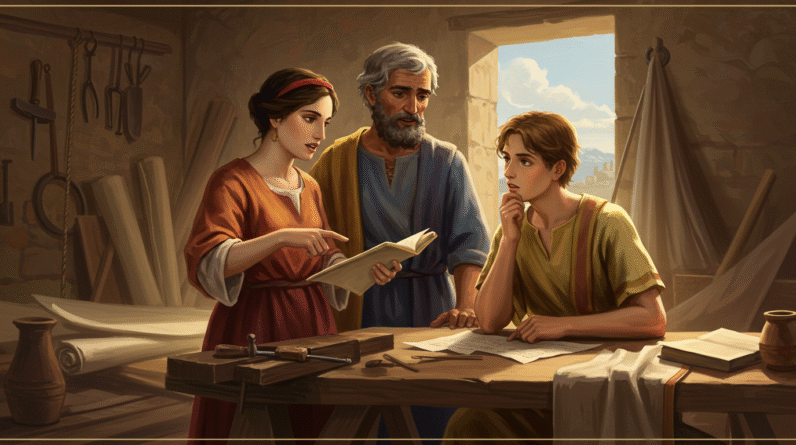How Abraham And Sarah Teach You Patience In Marriage
You’ve probably heard the story of Abraham and Sarah a hundred times, but there’s a reason it keeps coming back: their story is a masterclass in patience, faith, and the messy reality of waiting together. When you study Abraham and Sarah’s marriage lessons, you don’t just get a timeline of events — you get practical, sometimes painful insights about how waiting shapes two people, their relationship, and their faith. Their journey isn’t neat or ideal; it’s raw and real, much like most marriages. You’ll see hope, failure, reconciliation, and eventual fulfillment — and you’ll find points of application for your own marriage right away.
The Background: Why Their Story Still Matters to You
When you read about Abraham and Sarah, you’re reading about a couple called out of the ordinary into something bigger than themselves. God invited Abraham to leave his homeland and follow a promise (see Genesis 12:1-4). That call set the stage for years of waiting, testing, and refining. For your marriage, that’s an important starting point: you and your spouse may be called into seasons that don’t make sense initially, but those seasons can shape you into something stronger.
Their story gives you a real-world example of how faith intersects with everyday marital struggles. As you explore Abraham and Sarah’s marriage lessons, remember that the Bible presents people with flaws and failures so you can learn from them — not to idolize them — but to glean wisdom for your life. You don’t have to be perfect to benefit from their experience.
God’s Promise and the Long Wait
You can trace much of the tension in Abraham and Sarah’s marriage to a single promise: God told Abraham that he would be the father of a great nation and that his descendants would be numerous (read Genesis 15:1-6). That promise anchored their identity, but it also introduced a long season of waiting. When a promise takes decades to fulfill, the waiting becomes a test not just of faith, but of marriage dynamics, expectations, and endurance.
You’ll notice that long waits often provoke strong responses: fear, bargaining, creative problem-solving, and sometimes actions taken out of impatience. That’s exactly what happened in Abraham and Sarah’s home. When you think about Abraham and Sarah’s marriage lessons, their waiting period is central — it’s where many lessons in trust, communication, and consequences play out.
The Tension: When Faith and Impatience Collide
When Sarah remained barren, impatience entered their marriage. Sarah suggested that Abraham have a child with her maidservant, Hagar, to fulfill the promise sooner (see Genesis 16:1-4). On the surface, it looked like a pragmatic solution. To you, it might also feel familiar: when hope feels stalled, quick fixes look attractive.
But the outcome shows you why impatience is dangerous. The decision created rivalry, pain, and long-term strife within the family. As you reflect on Abraham and Sarah’s marriage lessons, you’ll recognize that well-intentioned but impatient choices can fracture relationships and derail the process God (or whatever guiding principle you hold) intended to accomplish. The consequences of Hagar and Ishmael’s story echo for generations, demonstrating how one impulsive decision can complicate many lives.
The Role of Doubt and Reassurance
You might wonder whether Abraham and Sarah lost faith during the wait. The answer is complicated. Abraham had moments of faith and moments of doubt. God reaffirmed His promise multiple times, encouraging Abraham to trust (see Genesis 17:15-19). These reiterations are significant for your marriage: they show that reassurance often needs to be repeated, and that leadership and faith in a marriage are not static qualities — they’re cultivated over time.
God’s repeated reminders didn’t just stabilize Abraham; they helped recalibrate Sarah’s expectations, too. For you, that means that reassurance — whether from God, a pastor, a counselor, or your spouse — can sustain you through seasons when doubt creeps in. Knowing that doubts are normal but repairable can be a lifeline.
Laughter, Astonishment, and the Human Response
When God told Abraham that Sarah would bear a son in her old age, both Abraham and Sarah laughed — but for different reasons. Abraham laughed with curiosity, while Sarah laughed out of disbelief (see Genesis 18:9-15). When you process Abraham and Sarah’s marriage lessons, you’ll see that laughter here is a natural, human response to the absurdity of God’s timing.
Your marriage will have moments that feel absurdly out of step with your expectations — and laughter is an appropriate response sometimes. It doesn’t always indicate unbelief; often it’s a survival mechanism. But their laughter also reveals vulnerability. Sarah’s inward chuckle became a teaching moment about trusting the improbable. For your marriage, when the promises you’ve been holding onto feel ridiculous, allow space for honest emotion, but don’t let that emotion become the final word.
The Birth of Isaac: The Fruit of Endurance
After years of waiting and many setbacks, Sarah gave birth to Isaac (see Genesis 21:1-7). This moment is the payoff of perseverance, patience, and returning to God’s timing. For you, Isaac’s birth is a reminder that waiting often yields tangible fruit, even if the process is messy.
When you’re in a season of longing or deferred dreams, remember that outcome and process aren’t always aligned in neat timelines. The fulfillment might come later and look different from what you expected — but that doesn’t mean it’s less real. Abraham and Sarah’s marriage lessons show you that endurance with humility and spiritual dependence can lead to moments of wonder.

Faith Beyond the Promise: Abraham’s Test
Even after Isaac’s birth, Abraham’s faith was tested again when God asked him to offer Isaac as a sacrifice (see Genesis 22:1-2). That episode reveals a deeper layer of marital lesson: sometimes the thing you were waiting for becomes the instrument of a new test. For Abraham and Sarah’s marriage lessons, this moment forces you to reckon with obedience that costs you deeply.
From your vantage point, you can see that marriage isn’t safeguarded from trials even when promises are fulfilled. It demands continual trust. The willingness to place what you value most into God’s hands models a spiritual posture for your marriage — one where trust and obedience to a higher good are prioritized over holding onto control.
Reconciliation and Restoration: The Aftermath of Mistakes
Abraham and Sarah didn’t get everything right. Their decisions caused pain, especially Sarah’s suggestion to use Hagar. Yet the biblical narrative moves toward reconciliation and redemption. God’s faithfulness to the original promise outlasts human mistakes, and the couple experiences restoration even after missteps (see Romans 4:18-21). That’s a powerful part of Abraham and Sarah’s marriage lessons: your failures aren’t the final chapter.
For your marriage, restoration often involves humility, confession, and a recommitment to trust. You learn that patience involves not just waiting, but also the capacity to repair and rebuild when impatience damages the relationship. The biblical story encourages you to hold onto hope for restoration even after painful choices.
Sarah’s Example of Godly Submission and Strength
Scripture later points to Sarah as a model of faith and godly conduct (see 1 Peter 3:5-6). That doesn’t mean her life was flawless. Rather, she becomes an example of what commitment and trust can look like across a long marriage where faith is central. When you explore Abraham and Sarah’s marriage lessons, Sarah’s story gives you a blueprint for steadfastness under pressure.
For you, Sarah’s legacy suggests that patience in marriage is also about maintaining dignity, faithfulness, and inner strength. It’s about refusing to allow deferred dreams to harden your heart or distort your treatment of your spouse.
What Patience Looks Like in Practice for You
You may read these stories and appreciate the spiritual arc, but how do you turn them into daily practices with your spouse? Abraham and Sarah’s marriage lessons show several concrete behaviors: persistent communication, mutual encouragement, willingness to wait together before acting rashly, and the practice of returning to God (or your shared values) for perspective.
When you’re tempted to take matters into your own hands (like Sarah did with Hagar), pause and talk before making irreversible decisions. Waiting together means aligning your timeline, being transparent about fears, and choosing your spouse’s dignity over your impatience. Practically, this might look like setting time to pray or reflect together, scheduling intentional heart-to-heart conversations about longings and fears, or agreeing to delay big decisions for a season of joint discernment.
Handling Disappointment Without Ruining Your Marriage
Disappointment is inevitable in any long marriage. Abraham and Sarah’s marriage lessons teach you that disappointment can be formative if you allow it to be. Sarah’s barrenness and the pain it caused didn’t destroy her identity; eventually, it expanded her faith. You’ll learn that you can hold disappointment and still choose trust, growth, and unity.
Avoid the tendency to weaponize disappointment. Don’t let unmet expectations become ammunition you use in fights. Instead, use them as a prompt to slow down and re-evaluate your approach. When you process disappointment together, you create pathways for healing instead of walls.
Balancing Initiative and Patience
One of the trickiest aspects of marriage is discerning when to act and when to wait. Abraham and Sarah’s story shows both the danger of premature initiative and the blessing of faithful waiting. You need initiative to steward your family and relationships responsibly, but you also need patience to let certain promises unfold in their own time.
Take cues from scripture’s emphasis on faithfulness rather than frantic control. Abraham received clear direction from God earlier in his story, and yet moments of impatience still occurred. For your marriage, this translates into a rhythm: act where you’re called to act; wait where you’re called to trust. Develop a shared process for discerning which is which – prayer, counsel, and honest discussion can help you align.
Communication: The Glue That Makes Patience Sustainable
When you aim to practice patience, communication is your best ally. Abraham and Sarah had conversations (some hopeful, some fraught) that influenced their course. When you invest in the discipline of regular, honest communication, patience becomes less like passive endurance and more like an active, shared stance.
You can start with simple habits: weekly check-ins about hopes and fears, intentional listening exercises where you practice mirroring what your spouse is saying, or setting clear timelines for revisiting big issues so waiting doesn’t feel indefinite. Abraham and Sarah’s marriage lessons emphasize that waiting together requires you to keep talking — not to avoid pain, but to process it together.
Faith as a Shared Resource
If faith is part of your lives, it can become a shared resource that bolsters patience. Abraham and Sarah’s faith was uneven at times, but it remained central to their identity. When you practice faith together — through prayer, worship, scripture study, or shared spiritual practices — you establish a framework in which patience is more likely to flourish.
Even if your faith journeys differ, creating a mutual respect for each person’s spiritual orientation will help you weather waiting periods. Abraham and Sarah’s marriage lessons show that spiritual unity isn’t about uniform belief at every stage; it’s about making trust and divine sovereignty part of your marital vocabulary.
Managing Expectations: Realistic Hope vs. Fantasy
One subtle way impatience damages marriage is by holding onto unrealistic expectations. You might hope God will answer in exactly the way you want, or you might expect your spouse to “fix” unmet longings. Abraham and Sarah’s marriage lessons teach you to hold realistic hope: expect that God’s timing may differ from yours, and expect that your spouse is not a substitute for ultimate fulfillment.
Recalibrate expectations together. Decide which hopes are negotiable and which are non-negotiable, and commit to revisiting them periodically. When you do this, patience becomes a proactive choice rather than a passive resignation.
Learning from Their Mistakes: Accountability and Humility
Abraham and Sarah made choices that caused pain, and scripture doesn’t hide those choices. For your marriage, this is instructive: mistakes will happen, and the best path forward is accountability, humility, and corrective action. Admit when you’ve acted out of fear or impatience. Ask forgiveness. Seek counsel if needed.
Abraham and Sarah’s marriage lessons show that humility doesn’t erase consequences, but it opens the door for restoration. Practice admitting fault quickly and making tangible amends — that’s how you create a culture where patience is respected and nurtured.
Practical Tools to Grow Patience Together
You want tools that help you live out these lessons. Try these practices inspired by Abraham and Sarah marriage lessons: set regular times for spiritual reflection together, create a joint “waiting covenant” where you agree to delay certain decisions, practice active listening, and establish a short-term plan for immediate concerns that don’t compromise long-term patience. If spiritual direction is central to your life, include shared prayer and scripture reading as part of your habit formation.
Also consider professional help if waiting leads to chronic conflict. A counselor or pastor can help you develop a plan that honors both your immediate needs and long-term calling. These tools help you convert patience from a passive state into an active partnership in your marriage.
The Long View: Seeing Your Marriage as a Story, Not a Snapshot
One of the most freeing parts of Abraham and Sarah’s marriage lessons is the long view. Their story spans decades. If you think in decades rather than days, you’ll make different decisions. You’ll be more likely to choose patience, forgiveness, and investment in growth because you’re orienting toward a larger narrative.
When you see your marriage as a story, you can hold current trials within the context of future grace. You’ll be less likely to make single-season choices that damage the plot. That shift in perspective alone can transform how you practice patience together.
Handling External Pressure and Internal Fear
Abraham and Sarah faced external pressures: societal expectations, family dynamics, and cultural norms. You face similar pressures today: social media timelines, family expectations, and competing voices about how life “should” look. These pressures intensify impatience. Abraham and Sarah’s marriage lessons remind you to filter external noise through your shared convictions.
Internally, fear drives many impulsive actions. Sarah’s suggestion about Hagar came out of fear. For your marriage, naming fears aloud and creating a strategy to address them together reduces the need for unilateral fixes. When fear is named, patience becomes doable rather than daunting.
When Patience Turns Into Passivity: Know the Difference
Patience is a virtue, but passivity can masquerade as patience. Abraham and Sarah’s marriage lessons help you distinguish between waiting faithfully and avoiding responsibility. Waiting faithfully involves active trust — prayer, discernment, wise counsel, and preparation. Passivity is avoidance, neglect, or refusal to make necessary, loving choices.
Ensure you’re not just waiting; be engaged in the process. Plan, prepare, work, and then wait. This balance protects your marriage from stagnation while still honoring the rhythm of waiting.
How to Pray and Hope Together Like Abraham and Sarah
Prayer sustained Abraham and Sarah through much of their journey. When you pray together, you’re practicing the same discipline that grounded them. Create simple prayer rhythms: short daily prayers for patience, longer weekly dialogues about hopes, or a monthly time to evaluate how both of you are doing emotionally and spiritually.
Hope is linked to the object of your trust. If your hope is anchored in something stable — God, your shared values, the long-term vision for your family — then patience becomes a reasonable strategy. Abraham and Sarah’s marriage lessons encourage you to keep hope active by renewing it habitually through prayer and shared reflection.
Final Reflections: What Abraham and Sarah Teach You About Marriage
When you distill Abraham and Sarah’s marriage lessons, three core truths stand out: faith and patience are relational practices; impatience causes ripple effects that harm relationships; and restoration is possible even after severe mistakes. Their story invites you to a patient endurance that’s not passive, but engaged — a patient persistence anchored in something larger than temporary frustrations.
You’ll likely wrestle with the tension between wanting immediate answers and learning to wait. Embrace that tension as part of your growth. When you choose to practice patience together, you’re choosing a path that leads to deeper trust, humility, and resilience. Abraham and Sarah’s story doesn’t grant you a formula, but it gives you a living example of how patience can transform a marriage into a vessel of faith and endurance.
If you want a quick guide to hold onto, remember this: talk before decisions, name fears, create spiritual rhythms, seek counsel, and commit to restoration practices when mistakes happen. These principles help you translate Abraham and Sarah’s marriage lessons into everyday choices that protect and strengthen your relationship.
Where to Go From Here
You’ve been given a lot to think about. Start small. Pick one practice — maybe a weekly check-in or a short nightly prayer — and commit to it for a month. Watch how small acts of patience compound. If you find old wounds or patterns that won’t change with small steps, reach out for counseling or pastoral guidance. Remember, patience in marriage doesn’t mean doing it alone.
The story of Abraham and Sarah points you toward a marriage that’s resilient, hopeful, and capable of transformation. Their life together challenges you to choose faith over panic, trust over expedience, and long-term love over immediate gratification. When you embody those choices, you’re living out the very lessons their story teaches.
Explore More
For further reading and encouragement, check out these posts:
👉 7 Bible Verses About Faith in Hard Times
👉 Job’s Faith: What We Can Learn From His Trials
👉 How To Trust God When Everything Falls Apart
👉 Why God Allows Suffering – A Biblical Perspective
👉 Faith Over Fear: How To Stand Strong In Uncertain Seasons
👉 How To Encourage Someone Struggling With Their Faith
👉 5 Prayers for Strength When You’re Feeling Weak

📘 Jesus and the Woman Caught in Adultery – Grace and Mercy Over Judgement
A powerful retelling of John 8:1-11. This book brings to life the depth of forgiveness, mercy, and God’s unwavering love.
👉 Check it now on Amazon 🛒💥
🔥 “Every great message deserves a home online.” 🌍💬🏡
Don’t let your calling stay hidden. Start a Christian blog or website using Hostinger — with 99.9% uptime, a free domain, and SSL, your voice can shine for God’s glory anytime, anywhere.
💥 Begin today. 🛒 Try it RISK-FREE! ✅
✝️ “Your body is God’s temple — care for it with purpose.” 💪💖🏛️
Renew your energy and restore balance naturally. Mitolyn helps support a healthy metabolism, giving you the vitality to live out God’s calling with strength and confidence.
🔥 Unlock Your Metabolic Power! ⚡Burn More Calories & Feel Great With Mitolyn. 💪
👉 Start Today. 🚀 Check Price Now. 🛒💰
💰 As a ClickBank & Amazon Affiliate, I earn from qualifying purchases.
📖 Acknowledgment: All Bible verses referenced in this article were accessed via Bible Gateway (or Bible Hub).
🚀 Want to explore more? 👉 Dive into our new post on Why Jesus? and experience the 🔥 life-changing truth of the Gospel!








